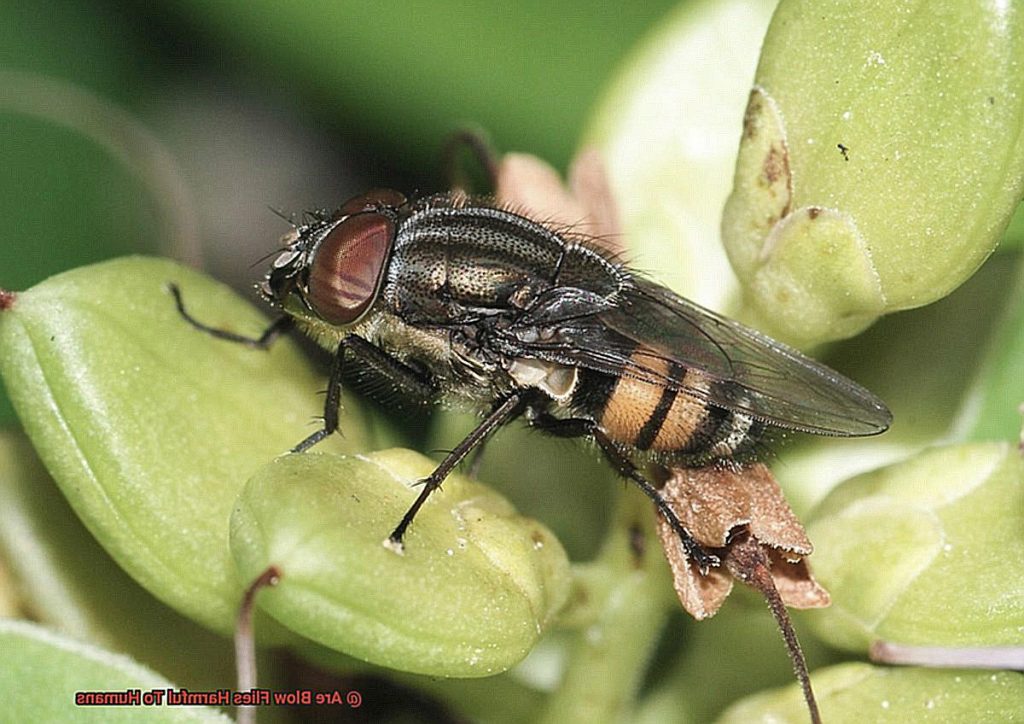Imagine this: You’re savoring a scrumptious meal outside in the warm summer breeze when you feel a tickle on your leg. You glance down to see a bothersome blow fly flitting around you. But, did you know that these winged pests could be more than just an annoyance? That’s right. Blow flies have been making headlines lately due to their potential health hazards for humans.
These insects are renowned for their vivid metallic hues and the droning buzz they emit as they fly. However, what you might not realize is that they reproduce and feed on decomposing matter, including animal cadavers and even human remains. As revolting as it may sound, this puts them in close proximity to harmful bacteria and other pathogens that can lead to severe illnesses like Cholera and E. Coli.
But, should you be fretting about blow flies in your everyday life? In this blog post, we’ll delve deeper into this question and explore whether or not blow flies are dangerous to humans. We’ll examine the various types of blow flies, their life cycles, and their possible impact on our well-being. So fasten your seatbelts and let’s embark on a journey to uncover the truth about blow flies.
What are Blow Flies?
Contents
- 1 What are Blow Flies?
- 2 Potential Health Risks of Blow Flies
- 3 How Do Blow Flies Spread Disease?
- 4 Skin Irritation and Allergic Reactions from Blow Flies
- 5 Prevention Strategies for Keeping Blow Flies Out of Your Home
- 6 Hygiene and Sanitation Practices to Reduce the Risk of Illness from Blow Flies
- 7 Conclusion
Well, it’s possible that you’ve had an encounter with a blow fly. These flies, also called bottle flies, are attracted to the smell of decomposing flesh and are commonly found near dead animals, garbage, and other decaying organic matter.
Blow flies belong to the Calliphoridae family and can be found all over the world, with about 150 species in North America alone. They have a unique life cycle that begins with an egg laid by an adult female blow fly on decaying matter or animal carcasses. The eggs hatch into larvae, which feed on the dead material until they are ready to pupate. After pupating, the adult blow fly emerges and begins the cycle again.
While these flies may not be harmful to humans in themselves, they can carry bacteria, viruses, and other pathogens on their bodies and in their digestive systems. Some of these microorganisms can cause illnesses such as salmonella, E.coli, and cholera. Blow flies can transfer these harmful microorganisms to food or surfaces when they land on them or lay eggs on them. If humans come into contact with contaminated food or surfaces, they may become sick.
Blow flies are medium to large in size with big red eyes and short antennae. Their wings are clear with dark veins that make a buzzing sound when they fly. Although they may not pose a direct threat to humans, it’s important to take measures to prevent their presence and control their population in areas where people live and work.
In addition to their potential role in spreading disease, blow flies can cause skin irritation or allergic reactions in some people. This is because their saliva and excrement can contain chemicals that irritate the skin or cause an allergic reaction.
So what can we do to prevent blow flies from becoming a health risk? It’s important to practice good hygiene, sanitation practices, and take measures to prevent their entry into homes. This includes keeping garbage cans covered tightly, disposing of food waste properly, cleaning up spills promptly, and keeping surfaces clean.
Potential Health Risks of Blow Flies
They can pose actual dangers to human health. Blow flies are attracted to decaying organic matter, which means they are often found in unsanitary conditions where disease-causing bacteria and viruses thrive.
Blow flies have been known to transmit diseases such as typhoid, cholera, salmonella, and E. coli. These diseases can spread through contaminated surfaces or food that has been in contact with the flies. In addition, blow flies can also spread parasitic infections such as myiasis, which is caused by the larvae of certain fly species burrowing into living tissue.
But that’s not all. The proteins found in blow fly saliva and feces can trigger an immune response in sensitive individuals, causing allergic reactions such as itching, hives, and respiratory issues.
Moreover, blow flies can serve as a food source for other pests such as rodents and birds, leading to infestations and the spread of additional diseases.
So what can you do to protect yourself from these potential health risks? The first step is to practice good hygiene and sanitation practices to prevent the presence of blow flies. Properly disposing of garbage and keeping food covered and sealed are essential measures. Additionally, eliminating any breeding or feeding sources for these flies can help prevent infestations.
How Do Blow Flies Spread Disease?
While these insects may seem harmless, they can actually be carriers of disease and pose a serious threat to human health. But how exactly do blow flies spread disease?
One way blow flies spread disease is through their feeding habits. These insects are attracted to decaying organic matter, such as garbage and animal carcasses. When they feed on these materials, they can pick up harmful bacteria and viruses that can cause illness in humans.
But it gets worse. Blow flies also have the ability to transfer bacteria from one surface to another. This means that if a blow fly lands on a contaminated surface and then lands on a clean surface, it can transfer the bacteria from the contaminated surface to the clean one. Diseases like salmonella and E.coli can easily spread this way.
As if that wasn’t bad enough, blow flies can lay their eggs in decaying organic matter. When the eggs hatch, the larvae feed on the decaying material and can become carriers of disease-causing bacteria. If these larvae come into contact with humans or human food sources, they can spread the bacteria and cause illness.
So what can you do to protect yourself from blow fly-borne illnesses? First and foremost, practice good hygiene and sanitation practices to prevent their presence. Properly dispose of food waste and clean up any spills or messes promptly.
To prevent infestations in your home, tightly seal your garbage cans and dispose of any animal carcasses or feces promptly. If you spot blow flies in your home, consider using traps or contacting a pest control professional.
Skin Irritation and Allergic Reactions from Blow Flies
Blow flies may seem like harmless insects, but they can be a real nuisance in households, causing skin irritation and allergic reactions in humans. These tiny creatures are notorious for their feeding habits, feasting on decaying organic matter such as animal carcasses and garbage. Unfortunately, as blow flies move from place to place, they can pick up bacteria, fungi, and other microorganisms that can cause skin irritation and other health problems.
Allergic reactions to blow flies can range from mild skin irritation to more serious symptoms such as hives, swelling, and difficulty breathing. The severity of the reaction depends on several factors, including the individual’s immune system response, the extent of exposure to the fly, and the type of bacteria or other microorganisms present on the fly.
Blow fly larvae also pose a potential threat to humans through myiasis. This condition occurs when the larvae infest living tissue in animals or humans, causing skin irritation, inflammation, and even infections. Therefore, it is essential to keep your home tidy and dispose of any decaying organic matter properly to prevent blow fly infestations.
To prevent skin irritation and allergic reactions from blow flies, it is crucial to take preventive measures such as maintaining cleanliness and hygiene. Tighten garbage cans securely and dispose of animal carcasses or feces promptly to prevent infestations. If you experience any skin irritation or allergic reactions due to blow flies, seek medical attention immediately.
Prevention Strategies for Keeping Blow Flies Out of Your Home
Not only are they irritating, but they can also pose a serious health risk by carrying pathogens and bacteria that can cause illnesses such as vomiting, diarrhea, and meningitis. Fortunately, there are several prevention strategies that can help keep these pesky insects out of your living space.
One of the most effective prevention strategies is proper waste disposal. Blow flies are attracted to decaying organic matter, such as food scraps and pet waste. By ensuring that you dispose of your garbage properly using sealed trash cans and promptly disposing of any pet waste, you can significantly reduce the chances of attracting blow flies to your home.
Another essential step in preventing blow flies from entering your home is regular cleaning. Keep all surfaces, including floors, countertops, sinks, and drains clean. This will help eliminate potential breeding grounds for these pests and minimize the number of places where they can lay their eggs.
Keeping doors and windows closed or installing screens is also an effective way to prevent blow flies from gaining access to your home through open entryways. By taking this simple step, you can block their entry into your living space and keep them outside where they belong.
If you have a severe infestation, using insecticides can be an effective way to get rid of blow flies in your home. However, it’s vital to use them correctly and follow all instructions carefully.
If you’ve tried all prevention strategies and still have a blow fly problem, it may be time to call in a pest control professional. These experts have the knowledge and tools needed to effectively get rid of these pests and prevent future infestations.
Hygiene and Sanitation Practices to Reduce the Risk of Illness from Blow Flies
Blow flies are not just pesky insects buzzing around your home, but also a serious health hazard. These flies feed on decaying organic matter, including animal feces and rotting meat, which can harbor various disease-causing organisms. To reduce the risk of illness from blow flies, it is vital to maintain proper hygiene and sanitation practices in and around your home.
One of the best ways to prevent blow fly infestations is by properly disposing of all garbage and waste materials. This means wrapping all food scraps and placing them in sealed containers before disposal. It is also essential to keep garbage bins tightly closed to prevent access by blow flies. Regularly cleaning the garbage bin with hot soapy water can help eliminate any bacteria or odor that may attract blow flies.
Keeping your kitchen clean and free of any food spills or debris is another critical practice. Blow flies are attracted to food residue, so it is crucial to wipe down counters, clean dishes promptly, and store food in airtight containers. After feeding your pets, make sure to remove any pet food or water to prevent attracting blow flies.
Maintaining good personal hygiene practices can also help reduce the risk of illness from blow flies. Washing your hands thoroughly after handling garbage, cleaning, or preparing food can help prevent the spread of harmful bacteria. Wearing protective gloves when handling garbage or performing cleaning tasks can also minimize contact with potentially harmful materials.
Conclusion
In conclusion, blow flies may seem like harmless insects, but they can be a real threat to human health. These pesky bugs are attracted to rotting organic matter and can pick up harmful bacteria and viruses that can cause illness in humans. Diseases such as typhoid, cholera, salmonella, and E. coli have been known to be transmitted by blow flies. In addition, these insects can also spread parasitic infections such as myiasis.
The danger of blow flies lies in the microorganisms they carry on their bodies and in their digestive systems. When these flies land on food or surfaces, they can transfer these harmful microorganisms leading to illnesses such as salmonella, E.coli, and cholera.
To keep blow flies out of your home or workplace, it’s essential to practice good hygiene and sanitation practices. Properly disposing of garbage and keeping food covered and sealed are crucial measures. Eliminating any breeding or feeding sources for these pests is also necessary.
If you experience skin irritation or allergic reactions due to blow flies, seek medical attention immediately. To prevent infestations from happening in the first place, regular cleaning of all surfaces including floors, countertops, sinks and drains is necessary.
In case of severe infestation using insecticides with caution is an effective way to get rid of blow flies in your home. However, prevention is always better than cure when it comes to pest control. If all prevention strategies fail then calling a pest control professional is the best option available for getting rid of these pests effectively and preventing future infestations.









